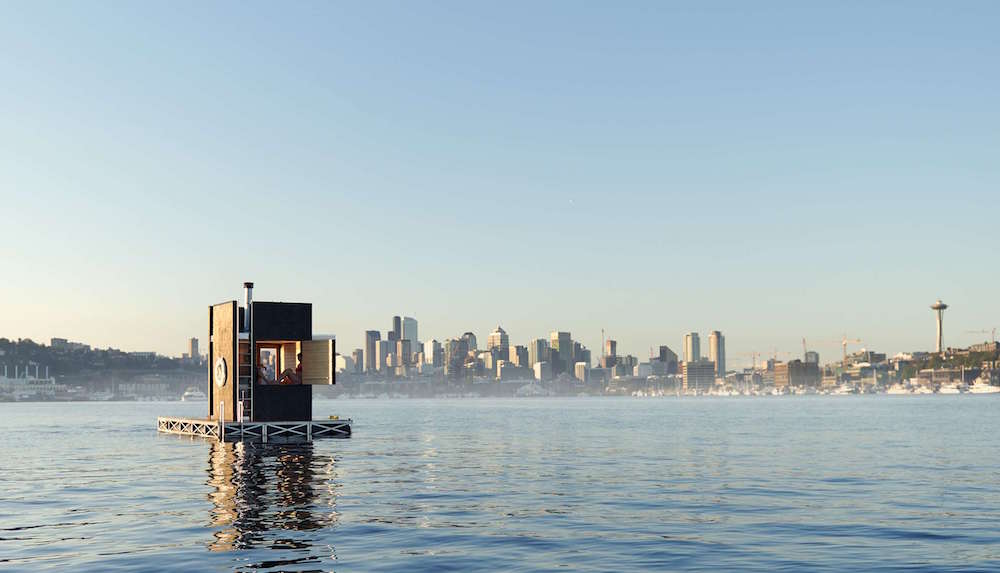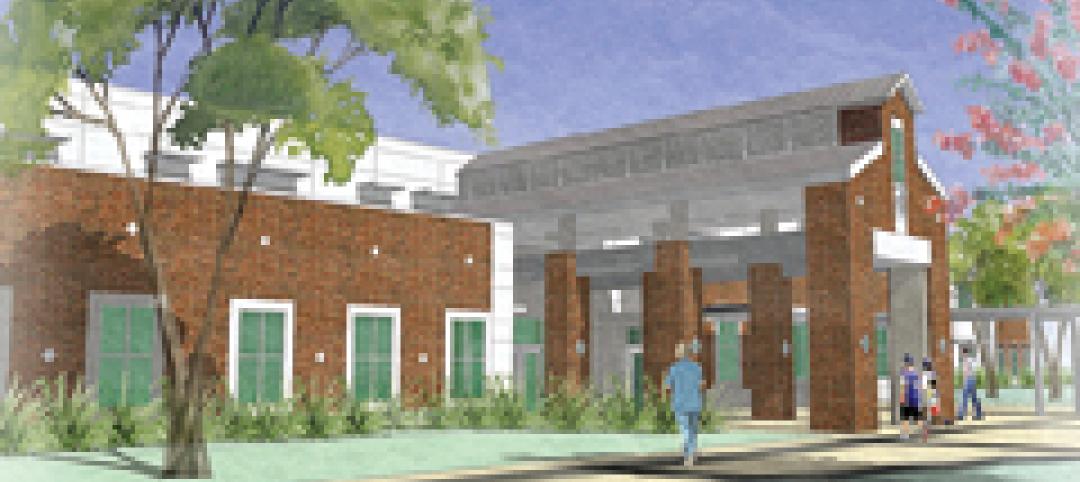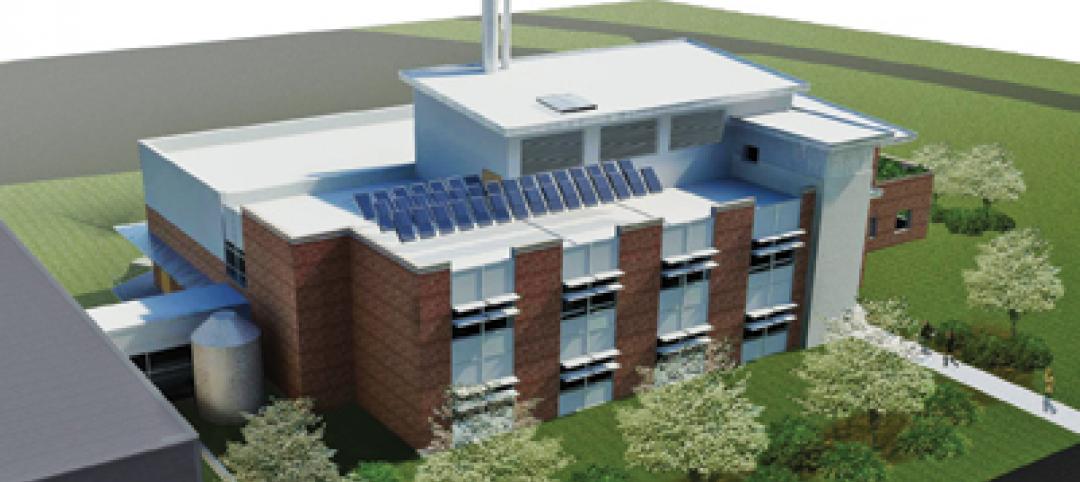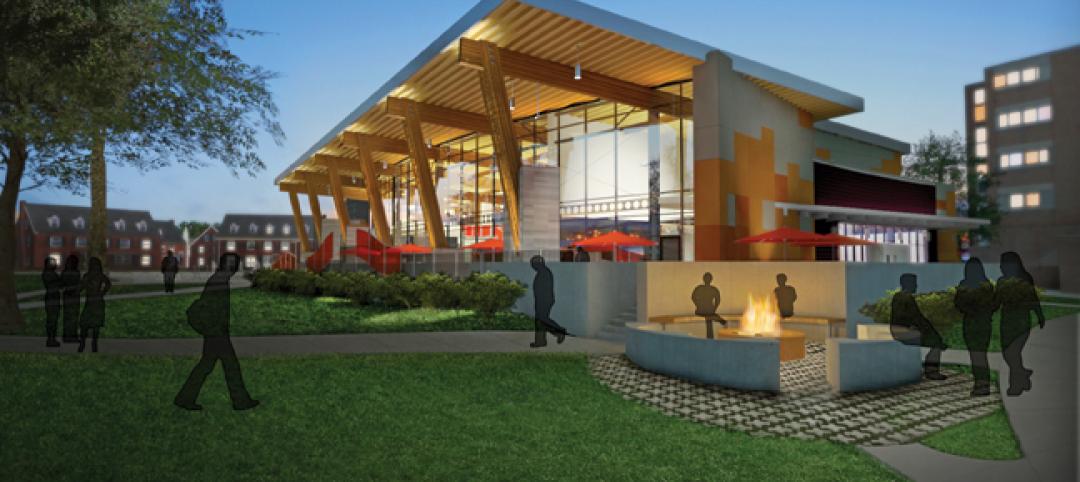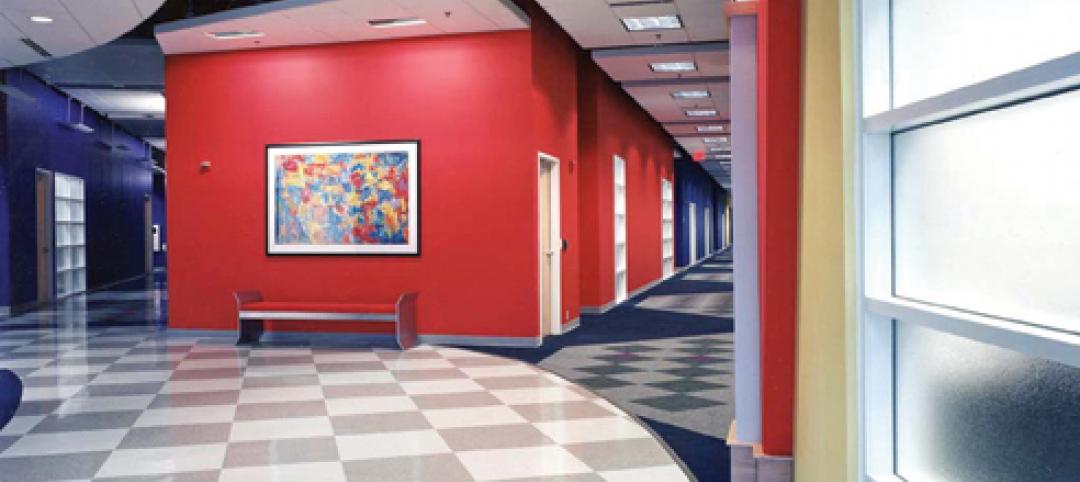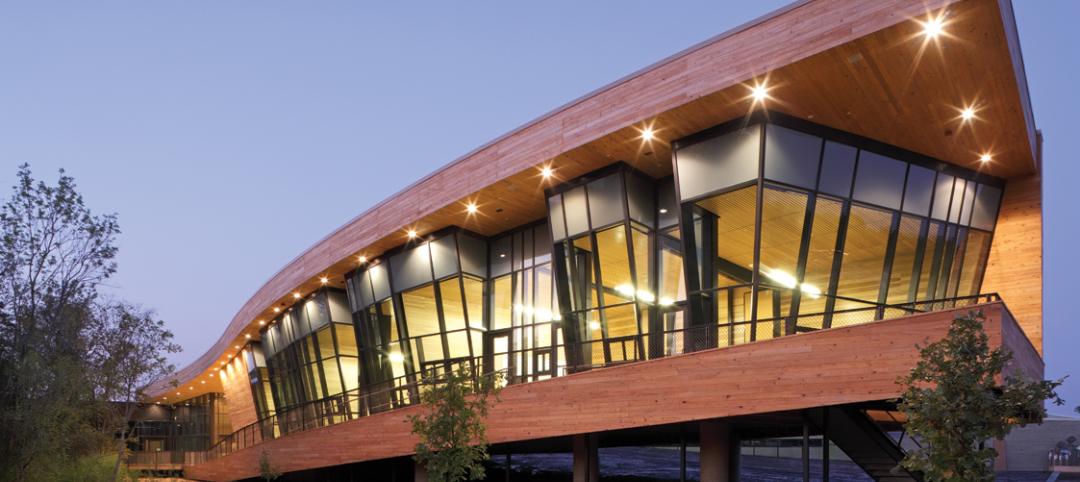The American Institute of Architects (AIA) selected nine recipients of the 2016 Small Project Awards.
Now in its 13th year, the AIA Small Project Awards Program recognizes the work of small-project practitioners and promotes small-project design.
Award recipients are categorized into two groups. Category 1 is small project construction, objects, works of environmental art or architectural design elements up to $150,000 in construction cost. Category 2 is small project construction up to $1.5 million in construction cost.
“With construction budgets regularly running into the tens and hundreds of millions of dollars, it’s important to emphasize the impact smaller projects can have,” said Jury Chair, Marika Snider, AIA. “As architects we strive to provide clients with more than just buildings, but solutions to improve life – these projects highlight this notion.”
The jury for the 2016 Small Project Awards includes: Marika Snider, AIA (Chair), Snider Architecture; Will Bruder, FAIA, Will Bruder Architects; Mira Locher, FAIA, Kajika Architecture; Elizabeth Ranieri, FAIA, Kuth Ranieri and Jonathan Tate, Office Jonathan Tate.
(Click images to enlarge)
Category 1
 Photo: Ed Massery, courtesy AIA.
Photo: Ed Massery, courtesy AIA.
Carnegie Library of Pittsburgh Studio Hive | Pittsburgh | GBBN Architects
The Studio Hive is part of the Teen Zone in the East Liberty Branch of the Carnegie Library of Pittsburgh. Made of wood and sound absorbent industrial felt, its creation has contributed to a 350% increase in attendance at the library’s teen programs and events. The design team developed a 3D digital model of the hive, which allowed designers to tune the form and refine it to minimize material waste. The connection to both the remaining library and the street provides teens with a sense of their social context and environment while they occupy a space that is uniquely personal.
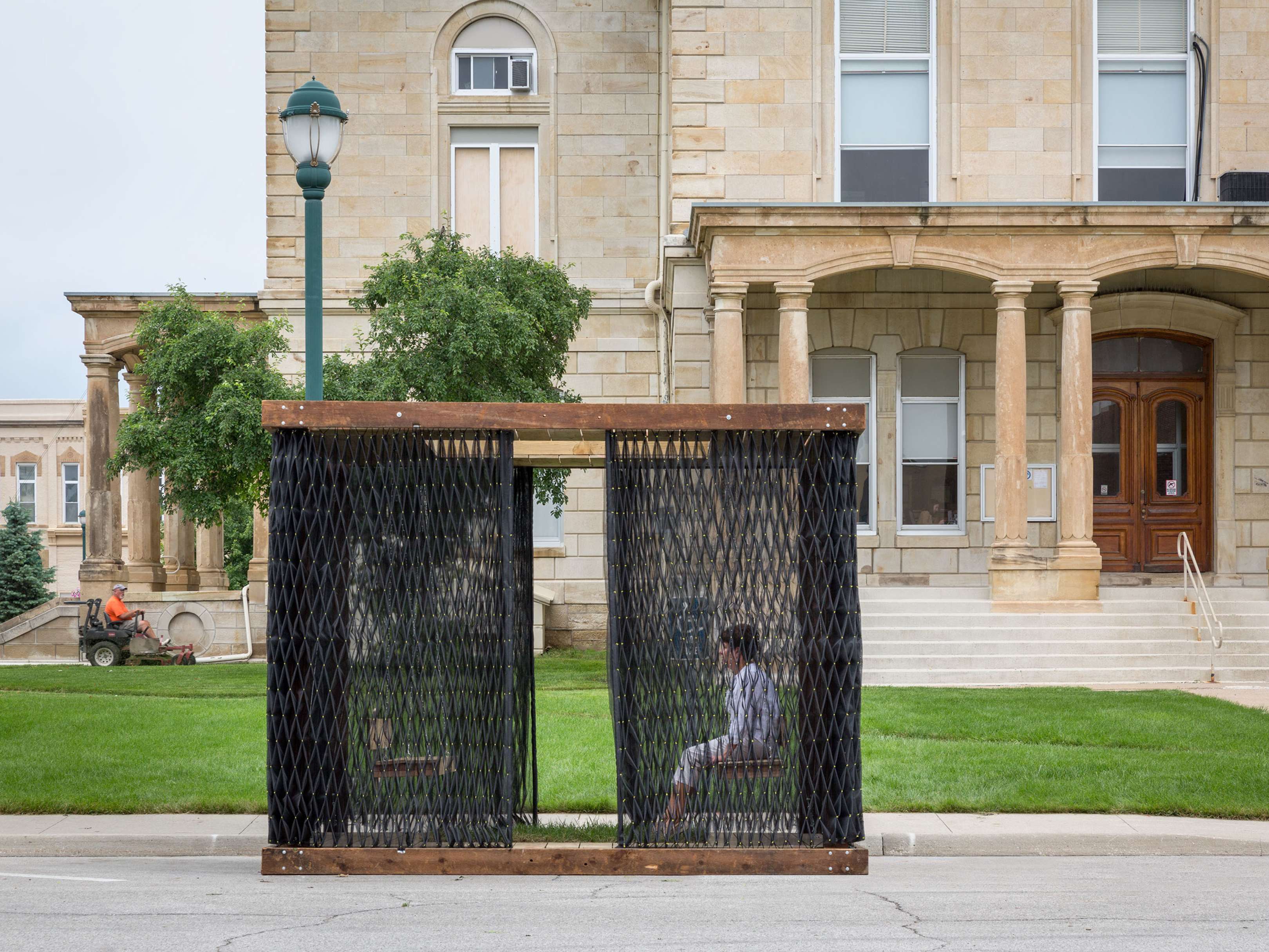 Photo: Paul Crosby, courtesy AIA.
Photo: Paul Crosby, courtesy AIA.
Deployable Smocked Porch | Winterset, Iowa | substance architecture
A simple wooden frame defines the small space and supports two porch swings. The smocked screening creates curtains that allow access and provide shade and enclosure. A rectangular opening in the roof allows a shaft of daylight to enter the space. This opening is echoed in the small turf area cut into the floor. The project was designed and constructed adjacent to the courthouse square in Winterset as a pro bono effort to support The Iowa Preservation Alliance. The wood was salvaged from a demolished home, and the labor to sew, fabricate, and construct the space were provided by the design team. As a result, the budget for the project was $900.
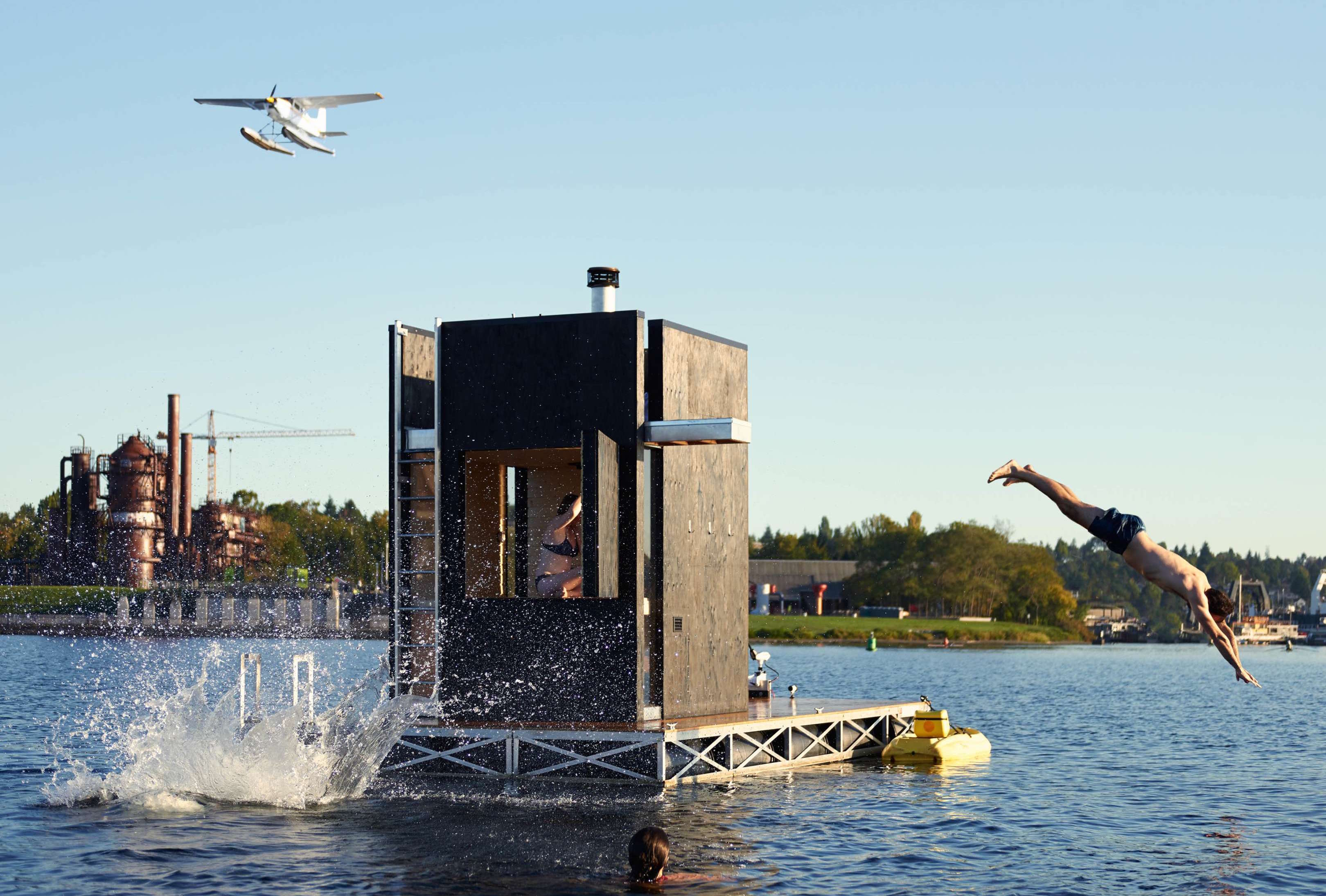 Photo: Kevin Scott, courtesy AIA.
Photo: Kevin Scott, courtesy AIA.
wa_sauna | Seattle | goCstudio
This floating sauna, funded through a crowdfunding campaign, functions as a boat that can be moored at a marina or private property and taken out on the open water. The interior is heated by a wood burning stove. As a mobile piece of architecture, wa_sauna is able to engage with people living aboard boats and houseboats as well as the large community of boaters, kayakers, paddle boarders and rowers. It uses a pre-manufactured aluminum frame and floatation system for the deck.
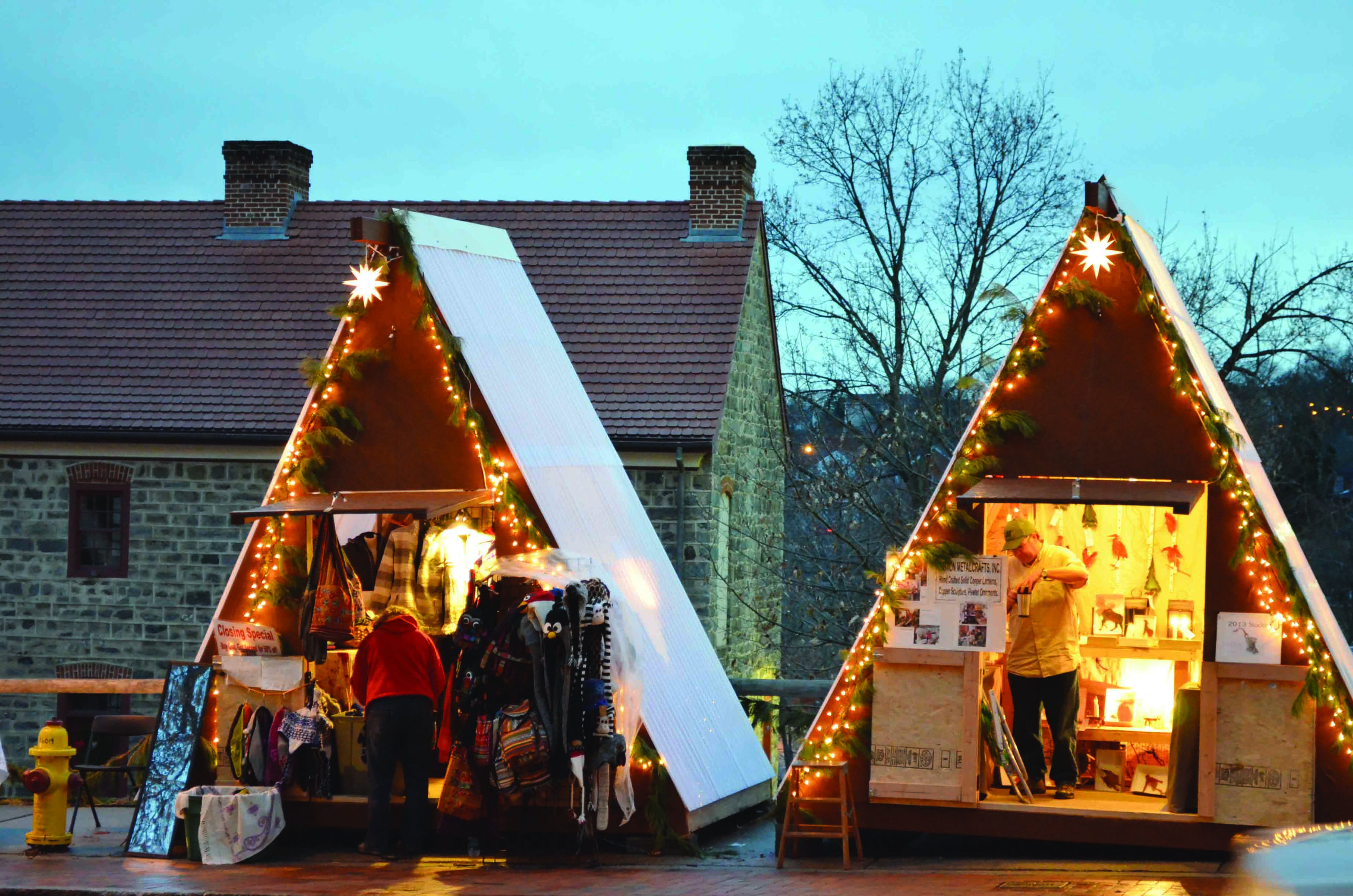 Photo: Nik Nikolov, courtesy AIA.
Photo: Nik Nikolov, courtesy AIA.
Weihnacht Huts | Bethlehem, Pennsylvania | NAD
This pro-bono design is for 35 craft exhibit huts for an authentic German Weihnachtsmarkt (open-air Christmas market). The huts feature a steeply-sloped roof designed for snowfall and a ridge line borrowed from traditional Moravian vernacular. With a limited budget for materials ($286 per unit), paired with the necessity for the structures to be taken apart and stored every year, the deck, walls, and roof panels are constructed as single units to be taken apart, transported, and stored flat with ease. The poly-carbonate roof is not only easy to dissemble, but also allows for a large amount of light and warmth inside during the day. During the night the huts are illuminated from within to add to the Christmas atmosphere of Bethlehem’s historic district.
Category 2
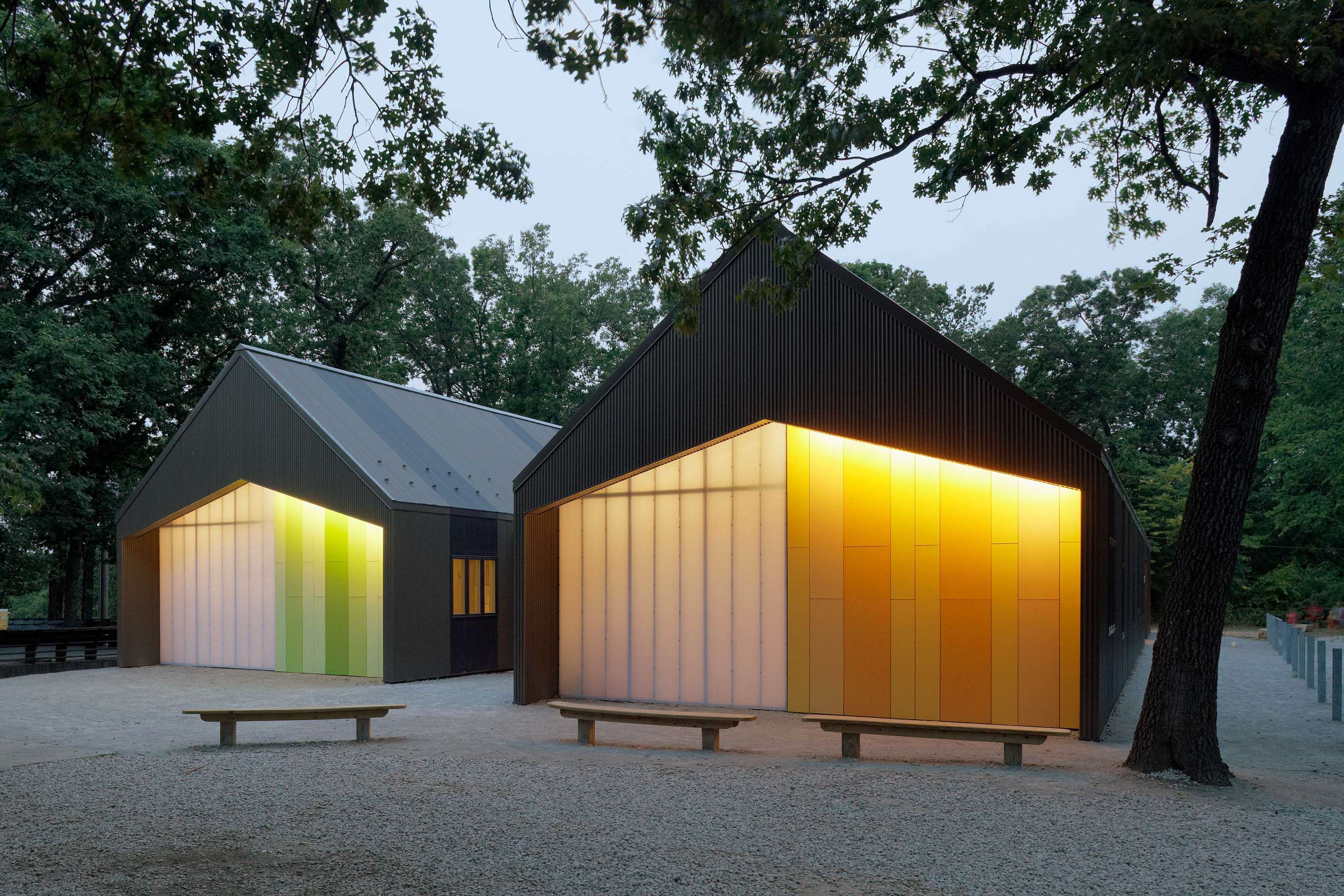 Photo: Mike Sinclair, courtesy AIA.
Photo: Mike Sinclair, courtesy AIA.
Girl Scouts Camp Prairie Schooner | Kansas City, Missouri | el dorado inc.
Camp Prairie Schooner features a dining hall, five permanent units, two buildings for troop use, a 40-foot rappel tower, an archery range, a swimming pool and a zipline. The load bearing walls of the structures are constructed of 2x6 wood studs that support a series of common & scissor trusses. The envelope is clad with corrugated metal panels, complementing the wood and aluminum clad windows and skylights. The end of the bunk houses are a combination of fluted polycarbonate glazing and painted concrete board over a rain screen system. All mechanical systems are concealed within the trusses. The pendant lights are custom fixtures designed and built by a former girl scout.
 Photo: Johnsen Schmaling Architects, courtesy AIA.
Photo: Johnsen Schmaling Architects, courtesy AIA.
Linear Cabin | Alma Lake, Wisconsin | Johnsen Schmaling Architects
The Linear Cabin is a small family retreat, its low-slung body sitting in a small clearing in Wisconsin’s North Woods. The building consists of three identically sized, nearly opaque boxes tied together with a continuous thin roof plane. The voids between the boxes allow for unobstructed views through the building from the outside, and into the sylvan landscape from within. The interior is clad in knotty pine, and is tempered by its crisply detailed joints and the simple lines of the lacquered millwork throughout. The cabin is wrapped in blackened cedar, with its darkness matching the weathered monochrome of traditional Wisconsin cabins.
 Photo: Will Crocker, courtesy AIA.
Photo: Will Crocker, courtesy AIA.
St. Pius Chapel & Prayer Garden | New Orleans | Eskew+Dumez+Ripple
The new chapel was designed as a quiet refuge and intimate sanctuary for reflection and contemplation. The sanctuary, which complements the modernist character of the adjacent church (circa 1963), is small but tall, keeping occupants close while inspiring reverence. Beyond a few pieces of furniture and religious items, the space’s power and purpose is enhanced by its very simplicity allowing occupants worship in quiet and contemplative solitude, without distraction.
 Photo: Mitch Tobias, courtesy AIA.
Photo: Mitch Tobias, courtesy AIA.
Studio Dental | San Francisco | Montalba Architects, Inc.
The goal was to create a spacious interior while packing Studio Dental’s required program for its mobile unit. The 26-foot-long trailer with 230 interior sf features a waiting area, sterilization room, and two operatories. The sterilization room is hidden behind millwork panels that wrap around to form the patient waiting bench. A centralized, double-sided millwork panel houses equipment for both operatories and gestures up to 11-foot-plus ceilings with translucent sculpted skylights. Materials include natural wood millwork, bright-white surfaces, and a custom perforation pattern.
 Photo: Iwan Baan, courtesy AIA.
Photo: Iwan Baan, courtesy AIA.
Village Health Works Staff Housing | Bujumbura Burundi | Louise Braverman, Architect
Embedded in the mountainside of an off-the-grid rural village in Burundi, this 18-bed staff housing is a bridge between East African elemental aesthetics and inventive sustainability. The 6,000-sf dormitory captures scenic mountain views. The same design aspects that establish its visual presence, such as airflow enhancing porches, also advance its sustainability.
Related Stories
| Nov 3, 2010
Senior housing will be affordable, sustainable
Horizons at Morgan Hill, a 49-unit affordable senior housing community in Morgan Hill, Calif., was designed by KTGY Group and developed by Urban Housing Communities. The $21.2 million, three-story building will offer 36 one-bed/bath units (773 sf) and 13 two-bed/bath units (1,025 sf) on a 2.6-acre site.
| Nov 3, 2010
Designs complete for new elementary school
SchenkelShultz has completed design of the new 101,270-sf elementary Highlands Elementary School, as well as designs for three existing buildings that will be renovated, in Kissimmee, Fla. The school will provide 48 classrooms for 920 students, a cafeteria, a media center, and a music/art suite with outdoor patio. Three facilities scheduled for renovations total 19,459 sf and include an eight-classroom building that will be used as an exceptional student education center, a older media center that will be used as a multipurpose building, and another building that will be reworked as a parent center, with two meeting rooms for community use. W.G. Mills/Ranger is serving as CM for the $15.1 million project.
| Nov 3, 2010
Chengdu retail center offers a blend of old and new China
The first phase of Pearl River New Town, an 80-acre project in Chengdu, in China’s Wenjiang District, is under way along the banks of the Jiang’an River. Chengdu was at one time a leading center for broadcloth production, and RTKL, which is overseeing the project’s master planning, architecture, branding, and landscape architecture, designed the project’s streets, pedestrian pathways, and bridges to resemble a woven fabric.
| Nov 3, 2010
Rotating atriums give Riyadh’s first Hilton an unusual twist
Goettsch Partners, in collaboration with Omrania & Associates (architect of record) and David Wrenn Interiors (interior designer), is serving as design architect for the five-star, 900-key Hilton Riyadh.
| Nov 3, 2010
Virginia biofuel research center moving along
The Sustainable Energy Technology Center has broken ground in October on the Danville, Va., campus of the Institute for Advanced Learning and Research. The 25,000-sf facility will be used to develop enhanced bio-based fuels, and will house research laboratories, support labs, graduate student research space, and faculty offices. Rainwater harvesting, a vegetated roof, low-VOC and recycled materials, photovoltaic panels, high-efficiency plumbing fixtures and water-saving systems, and LED light fixtures will be deployed. Dewberry served as lead architect, with Lord Aeck & Sargent serving as laboratory designer and sustainability consultant. Perigon Engineering consulted on high-bay process labs. New Atlantic Contracting is building the facility.
| Nov 3, 2010
Dining center cooks up LEED Platinum rating
Students at Bowling Green State University in Ohio will be eating in a new LEED Platinum multiuse dining center next fall. The 30,000-sf McDonald Dining Center will have a 700-seat main dining room, a quick-service restaurant, retail space, and multiple areas for students to gather inside and out, including a fire pit and several patios—one of them on the rooftop.
| Nov 2, 2010
11 Tips for Breathing New Life into Old Office Spaces
A slowdown in new construction has firms focusing on office reconstruction and interior renovations. Three experts from Hixson Architecture Engineering Interiors offer 11 tips for office renovation success. Tip #1: Check the landscaping.
| Nov 2, 2010
Cypress Siding Helps Nature Center Look its Part
The Trinity River Audubon Center, which sits within a 6,000-acre forest just outside Dallas, utilizes sustainable materials that help the $12.5 million nature center fit its wooded setting and put it on a path to earning LEED Gold.
| Nov 2, 2010
A Look Back at the Navy’s First LEED Gold
Building Design+Construction takes a retrospective tour of a pace-setting LEED project.
| Nov 2, 2010
Wind Power, Windy City-style
Building-integrated wind turbines lend a futuristic look to a parking structure in Chicago’s trendy River North neighborhood. Only time will tell how much power the wind devices will generate.


